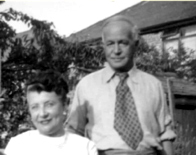Storekeeper and Newspaper Pioneer
Few will remember the Dewdrop Inn at Rumuruti, but the newspaper the Sunday Postwill ring many a bell. One man was responsible for both endeavours: John Sylvanus Rathbone. Clutching a map provided by the Land Office, in 1920 Rathbone walked from Thika in the direction of what became known as Nanyuki, excited by the prospect of developing a well-watered farm. The streams and rivers on the map, and its injunction preventing the structure of any wharves, landing stages or ferries, proved to be illusory. Instead Rathbone opened the first duka in Nanyuki, calling it Township Stores.
Rathbone was born in Sheffield on 25 Nov 1963 and was given the names John Silas. One of his first jobs was as a private tutor and elementary teacher in Sheffield, and there he met Emma Lucie Brenner, a language teacher born in Germany, but of Swiss nationality and a scion of the famous family for which the Brenner Pass is named. They married and soon had a son and a daughter. The daughter, born in 1906, seems to have provoked a breakdown, because we find Emma Lucie in ‘South Yorkshire Lunatic Asylum’ that year. The child lived only three years.
At the start of World War 1 Rathbone joined the army and fought in the German East Africa campaign. Of literary bent, he started a magazine for the troops called ‘Doing’. He was assisted in this enterprise by fellow soldiers George Kinnear (later editor of the East African Standard), and Herbert ‘Pop’ Binks, who called his column ‘What Binks Thinks.’ Returning to England after the war, Rathbone decided that he would like to try his fortune in East Africa. He was allotted one of the Soldier Settler farms. He lost his farm to his mortgager, but his duka was a success and he opened another in Nyeri, which failed. A successful establishment was the Dewdrop Inn at Rumuruti, which he owned. He was a driving force behind the establishment of Nanyuki school.

John Rathbone.
Rathbone lost his son, Allan Karl, on 16 December 1928, at the age of 23. Newspaper accounts recorded an accidental shooting, but the rumour was that he had committed suicide. Perhaps his lorry business was not going well. The young man was buried in Nanyuki cemetery, later to be joined by his mother in 1949.
Rathbone had never lost his strong Yorkshire accent or his enthusiasm for newspapers; his inky fingers prompted him to set up the Sunday Post in Nairobi in 1935. It was a very small outfit to begin with, with only three employees. Being the only Sunday paper, its circulation rapidly increased and more staff could be appointed. The paper enjoyed success for several years, with its social column ‘Miranda’s Merrier Moments.’ Rathbone started the Sunday Post Officers’ Club on Queensway in 1943. At the close of World War 2 Rathbone wanted his own printing press, and thus the English Press was founded, occupying large premises in Reata Road. Rathbone’s extensive interests helped to make his newspaper a success – he was widely read, could speak fluent German and French and was an engaging raconteur. His bookshelves were crammed with tomes on all subjects. But when the Aga Khan tried to buy his paper in the 1950s, the ageing Rathbone refused to sell to an Asian. His intransigence led the Aga Khan in 1960 to set up the Nation, which soon subsumed the Kenya Weekly News. Now the Sunday Postwas doomed and it soon folded.

John Rathbone and his second wife Olga.
Rathbone’s first wife had died in 1949, and the following year he married again – in South Africa to Olga Alferova, from a Russian family. She had been a ballet dancer with the Russian ballet in Paris, and never returned to Russia after the revolution. She nursed Rathbone in his declining years. He died in Nairobi on 25 November 1963 at the age of 84, and is buried in City Park cemetery in Nairobi.

Recent Comments